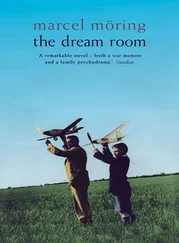1 ...7 8 9 11 12 13 ...24 Nina had left at around five. It was now nearly seven. I had spent about three hours in the house. I was dead tired. The cold, lugging all that wood, the chopping and splitting, had worn me out. As I sat there by the fire, my eyes grew blurred and I was overcome by a metallic feeling of exhaustion. The flames illuminated the green marble scrolls on the mantelpiece. The hearth began to look like a gateway. Beyond that gateway I saw the soot-covered wall of the chimney, the paler spots where the fire couldn’t reach and the blackened patch in which the brickwork was no more than a tar-nished bulge. The fire murmured and sighed. I heard the banging of the front door in the hall as the wind yanked it back and forth. I closed my eyes and thought about the fairy tale I had been working on for the past few months. It was as if something toppled over inside my head.
HE WHO WORKS his way past five mangy chickens, Yankel Davidovitz’s bony cow, and the massive stench of the rubbish dump behind the house of Schloime Kreisky, the hide trader, will be rewarded with a view of the sagging door of the Kotzker shul. It hangs in its cracked leather hinges like an unwashed dishrag, begging for a lick of paint, yammering for a little consideration, and maybe a nail or two. Around the door the walls of the shul struggle to hold each other up. The mortar between the bricks is brittle and crushed, the beam anchors rusty, the high windows black with soot. But even before his fingers have touched the door handle, a glob of snot dangling from the wood, even as he stands upon the threshold, trying to decide whether this wretched pile of bricks could possibly still be in use, his ears are graced by the gentle singsong and soft murmuring of the morning service, his nostrils teased by the smell of books, candied ginger, smoking oil lamps and the wax with which the rebbe’s wife polishes the tables, the chairs, in short, the entire shul.
Which brings us to the rebbe, the Reb, or simply, Menachem Mendel, the spiritual and social leader of the motley crew that constitutes Kotzker Jewry. Thirty years ago he came here from Pzysha and has been the rabbi of Kotzk ever since, thirty long years, the past ten of which he has spent in utter solitude, in the unrelent-ing, self-imposed confinement of his study. The last his followers ever heard from him, and that was seven years ago, was a furious, incomprehensible shout. Schloime Kreisky was the cause of this outburst, stinking Schloime, doomed to walk the earth amid the reek of rotting hides, hog’s piss and mouldering bark, Schloime, who had taken himself to the place of silence to ask the Reb what it meant when a slice of bread fell to the ground butter-side down, and was told in no uncertain terms that he was a ‘stinking swine’s tit’. Inquisitive as they are, those Kotzker Jews, the last-recorded words of Menachem Mendel were discussed at length, pondered, weighed, held up to the light, sucked on and chewed over until, at the end of a long night, Yankel Davidovitz slammed his palm down on the long wooden table in the middle of the study-house and roared, ‘But Schloime is a stinking swine’s tit!’ Whereupon the deeply wounded Schloime leapt to his feet and screamed at Yankel that while he might smell a bit unusual, at least he, Schloime Kreisky, hide trader of Kotzk, didn’t have daughters who disgraced the village by flirting shamelessly with every straw-haired fat-bellied Polak and that he could swear with his hand on his heart that he, Schloime Kreisky, would never milk an innocent cow dry like ‘some people around here’, to which Yankel shrugged his shoulders and said that his troubles were his own concern and that his cow, even if, God forbid, she should die, was still too good to serve as merchandise for a certain ‘hide trader’. From that day on, the silence between Schloime Kreisky and Yankel Davidovitz had been as profound as that surrounding Reb Menachem Mendel, and would have remained so, had not the Lord of the Universe in his immeasurable wisdom decreed that Schloime’s youngest son Mendel should fall in love with one of Davidovitz’s wanton daughters.
Mendel fell for Rivka like a rotting oak before the woodsman. He was young, barely eighteen and, like most lads his age, preoccupied with finding some rhyme or reason in this madly spinning world. His eyes drifted searchingly through the tops of the drooping oaks around Kotzk and sometimes, in autumn and spring, but now it was autumn, Mendel could feel his heart pounding wildly and he had to stifle the urge to sing and shout. Not that singing or shouting (in Kotzk there wasn’t much difference between the two) would be considered strange, on the contrary, but Mendel was afraid of what might fly from his lips. There was a tumult raging in his breast that he thought it might be better to suppress.
One autumn morning, Mendel arrived at the watering place along the road to Worki with his daily load of bark. He had been journey-ing since daybreak, and now that the sun was up and the sky had changed from purple to red to orange, he felt it was time for bread, water, and rest. He flung his load under an oak tree, scooped up water in the bowl of his hands, drank, sat down against the bundle of bark, and fell asleep. He began dreaming, something about the pile of hides behind the workshop. They rose up and came running after him, and he fell and they started dancing around him, but then he awoke and saw that he was surrounded by seven young women, all looking down at him and smiling. At first he closed his eyes, because he thought he had been captured by dybbuks and that his life on earth was at an end, but then he realized that their faces, a few of them at least, looked familiar.
‘Wait till your father hears about this!’ cried one of the girls.
Mendel opened his eyes. Before him stood Rivka Davidovitz. He had seen her once or twice in the women’s section at the shul, a hazy figure behind the wooden grating.
‘And when your father hears you’ve been talking to me …’ said Mendel, but he couldn’t think of what might happen because he had the feeling that Rivka Davidovitz’s sparkling eyes were pulling him to his feet.
‘Then what?’
Mendel swallowed. He opened his mouth and made an unintelligible sound.
The girls laughed and then ran off, Rivka last of all. He watched her go, she looked back, he smiled unhappily, she waved. He sank back against the bundle of bark and raised his eyes to heaven.
Mendel and Rivka had met and, as young people who in some strange way are meant for each other often do, they sought each other’s company again and again in conspicuously inconspicuous ways. They met at the watering place, outside the shul, at Aaron Minsky’s wedding, and when spring had come and summer and then a year had gone by, the whole village, except for the fathers, knew that these two were courting.
This went on until Yom Kippur, the time when one forgives the sins and misdeeds of others and repents for one’s own, when the poor Jews of Kotzk felt even more insignificant than they already were. On this High Holy Day the men of Kotzk sat in the shul in their shrouds, thinking glumly about all that had happened to them and all that they had done to others. Yankel Davidovitz was among them, brooding over the feud between himself and Schloime Krei-sky. When he had brooded long enough and the silence between him and the man sitting opposite him had taken on outlandish proportions in his guilt-ridden mind, he got to his feet. He offered Schloime his hand and said, ‘I’m the miserable swine’s tit, Schloime, forgive me.’ But Schloime, who had borne the smell of hog’s piss, tree-bark, and rotting hides ever since he was a boy – his father had been a hide trader, too – could not forget the affront. He jumped up, jabbed a forefinger into Yankel’s chest and yelled that he had nothing to forgive a man who, as far as he was concerned, didn’t even exist. Yankel, whose mind was shadowed by a breathtakingly dark cloud of sin, clapped his hands together and bowed his head. As he stood there before Schloime, who was trembling with rage, a voice rose from the group of men that had gathered around them. It was Aaron Minsky. ‘Stop this childish nonsense!’ he shouted. ‘The two of you can’t even make peace, when your own children have been courting for more than a year!’ It was as if Schloime had swallowed a shovelful of live coal. He dropped down onto a rickety bench, gasping for air, his head shaking, and asked if it were true, that his son Mendel, pure as the driven snow, was courting one of those Davidovitz witches, and which one …
Читать дальше












